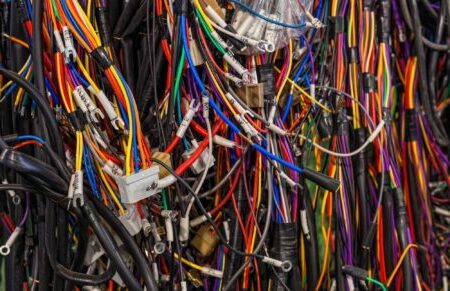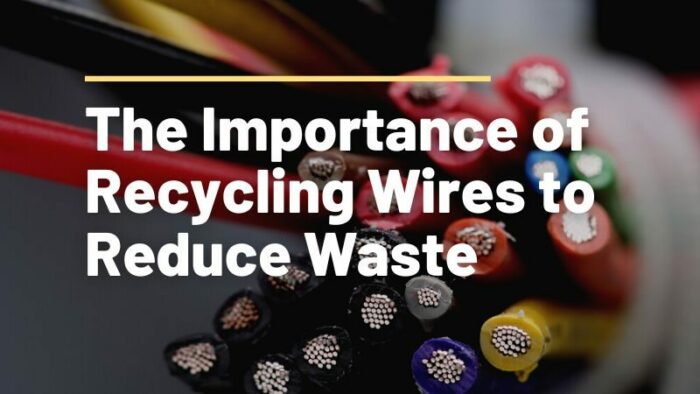Yes, it is possible to throw away wires. However, it is essential to properly dispose of wires and other electronic waste in an environmentally responsible manner.
Many electronic items, including wires, contain materials that can harm the environment if not disposed of properly. Recycling electronic waste, including wires, is recommended rather than throwing it away.
There are several options for recycling electronic waste, including taking it to a specialized recycling center or participating in a recycling program provided by your local government or a private company. Some electronics retailers also offer recycling services for certain types of electronic waste. By properly disposing of electronic waste, including wires, you can help protect the environment and reduce the negative impact of these materials on the planet.
Recycling Wires
Recycling wires is essential because it helps reduce electronic waste’s environmental impact and conserves natural resources. Wires and other electronic components contain various materials, including metals like copper, aluminum, and gold, as well as plastics and other substances. These materials can be recovered and used to make new products, which helps to reduce the need for mining and other resource-intensive activities.
There are several options for recycling wires and other electronic waste. Many communities have specialized recycling centers that accept a wide range of electronic items, including wires, for recycling. Some electronics retailers also offer recycling services for certain types of electronic waste. You can also check with your local government to see if any recycling programs are available.
Removing wires from any devices or equipment connected to them is generally recommended to prepare wires for recycling. It is also a good idea to separate different types of wires, such as power cords, data cables, and speaker wires, to make it easier for the recycling facility to process them.
By recycling wires, you can help reduce the environmental impact of electronic waste and contribute to the conservation of natural resources.

Where to Recycle Wires
There are several options for recycling wires and other electronic waste. Many communities have specialized recycling centers that accept a wide range of electronic items, including wires, for recycling. These centers are equipped to handle electronic waste in an environmentally responsible manner and can safely recover the materials contained in the wires for reuse.
To find a recycling center near you that accepts wires, you can search online for “electronic waste recycling” or “e-waste recycling,” followed by the name of your city or region. You can also check with your local government to see if they offer any recycling programs for electronic waste. Some electronics retailers also provide recycling services for certain types of electronic waste, including wires.
Removing wires from any devices or equipment connected to them is generally recommended before recycling them. It is also a good idea to separate different types of wires, such as power cords, data cables, and speaker wires, to make it easier for the recycling facility to process them. By adequately preparing your wires for recycling, you can help ensure that they are recycled efficiently and environmentally responsibly.
What Happens to Wires in the Landfill?
Wires and other electronic waste that are disposed of in a landfill can hurt the environment. Electronic waste in a landfill can take up valuable space and contribute to the overall volume of waste in the landfill.
In addition, electronic waste can release hazardous substances, such as heavy metals and chemicals, into the environment as it breaks down over time. These substances can contaminate soil and water and negatively impact plant and animal life.
Electronic waste can also release greenhouse gases, such as methane, as it decomposes in landfills. Methane, a potent greenhouse gas, contributes to climate change by trapping heat in the Earth’s atmosphere.
Disposal of electronic waste, including wires, is generally not recommended in landfills. Instead, it is recommended to recycle electronic waste in an environmentally responsible manner, as this can help to reduce the negative impact of these materials on the environment and conserve natural resources.
There are several options for recycling electronic waste, including taking it to a specialized recycling center or participating in a recycling program provided by your local government or a private company. Some electronics retailers also offer recycling services for certain types of electronic waste.
Conclusion
It’s essential to recycle wires and other electronic waste in an environmentally responsible manner to reduce their negative environmental impact. Wires and other electronic components contain various materials, including metals, plastics, and other substances, that can be recovered and used to make new products. This helps to conserve natural resources and reduce the need for resource-intensive activities such as mining.
There are several options for recycling electronic waste, including taking it to a specialized recycling center or participating in a recycling program provided by your local government or a private company. Some electronics retailers also offer recycling services for certain types of electronic waste.
It is generally recommended to remove wires from any devices or equipment connected to and separate different types of wires before recycling them to make it easier for the recycling facility to process them. By properly disposing of electronic waste, including wires, you can help protect the environment and reduce the negative impact of these materials on the planet.

